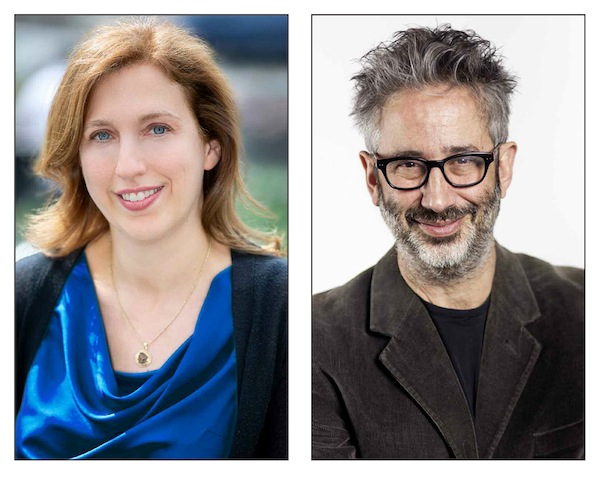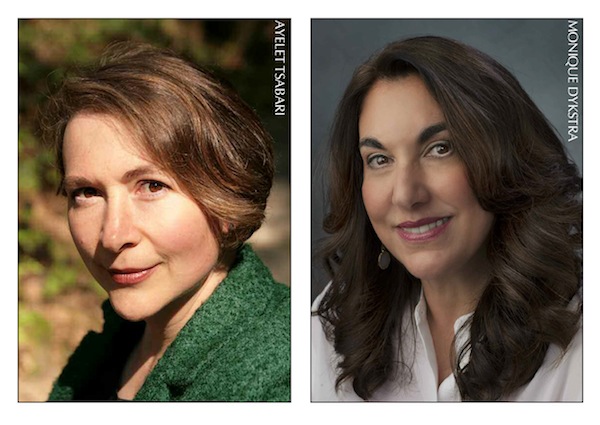Dara Horn and David Baddiel open the Cherie Smith JCC Jewish Book Festival on Feb. 6. (photos from JBF)
Early in her new book, People Love Dead Jews: Reports from a Haunted Present, Dara Horn reflects on a controversy at the Anne Frank House museum in Amsterdam, where an employee who wore a kippa to work was told by his employers to hide it under a baseball cap because it might interfere with the museum’s “independent position.”
“The museum finally relented after deliberating for four months, which seems like a rather long time for the Anne Frank House to ponder whether it was a good idea to force a Jew into hiding,” writes Horn.
The snappy summation is typical of the author’s approach: biting wit in the face of affronts of various dreadfulness. And the affronts pile up, supporting the incendiary thesis of the title.
Horn discusses the world’s interest in Anne Frank’s story, including the insistence on repeating the line from her diary, “I still believe, in spite of everything, that people are truly good at heart.” Leaving aside the fact that Frank wrote these words before she experienced how truly evil at heart some people can be, Horn writes, the line provides a “gift of grace and absolution from a murdered Jew (exactly the gift that lies at the heart of Christianity).”
Horn, who is part of the Feb. 6 launch event for the 2022 Cherie Smith JCC Jewish Book Festival, is a novelist with a PhD in Yiddish and Hebrew comparative literatures. Her take on contemporary antisemitism is suffused with her understanding of how Western audiences expect “coherence” and often an uplifting ending to the stories in our literature or other entertainment.
“Holocaust novels that have sold millions of copies both in the United States and overseas in recent years are all ‘uplifting,’ even when they include the odd dead kid,” she writes. “The Tattooist of Auschwitz, a recent international mega-bestseller touted for its ‘true story,’ manages to present an Auschwitz that involves a heartwarming romance. Sarah’s Key, The Book Thief, The Boy in [the] Striped Pyjamas, and many other bestsellers, some of which have even become required reading in schools, all involved non-Jewish rescuers who risk or sacrifice their own lives to save hapless Jews, thus inspiring us all.”
These uplifting stories, she points out, make up a large chunk of Holocaust-related literature, yet illustrate phenomena that were almost nonexistent during the Holocaust: non-Jews risking their lives to save Jews.
“Statistically speaking, this was not the experience of almost any Jews who endured the Holocaust,” she writes. “But for literature in non-Jewish languages, that grim reality is both inconvenient and irrelevant.”
She summarizes: “Dead Jews are supposed to teach us about the beauty of the world and the wonders of redemption – otherwise, what was the point of killing them in the first place?”
On the subject of non-Jewish rescuers, Horn goes into an extensive exploration of the life of Varian Fry, an American man who worked for the Emergency Rescue Committee, a group of American intellectuals that, beginning in 1940, distributed emergency American visas to endangered European artists and thinkers. What they envisioned rescuing was not so much the individuals themselves, but the very concept of European civilization, which they correctly believed to be in mortal danger from the Nazis. But, rescuing a culture’s greatest artists, writers and thinkers and sequestering them to safety in America, Horn posits, is itself “a sort of eugenics.”
For someone with an explicit distaste for disproportionate attention to rescue stories, Horn devotes a significant chunk in the middle of the book to what amounts to a biography of Fry. As the reader starts wondering how this fits into the larger thesis, Horn points out how the veneration of the more universal European culture for which Fry and his colleagues risked their lives was not extended to the particular Jewish culture that was the expressed target of the Nazis.
“Fry tried to save the culture of Europe, and for that he should be remembered and praised,” Horn writes. “But no one tried to save the culture of Hasidism, for example, with its devotion to ordinary, everyday holiness – or Misnagdim, the opposing religious movement within traditional Eastern European Judaism, whose energy in the years before the war was channeled into the rigourous study of musar, or ethics. Entire academies devoted to the Musar Movement were destroyed, their books burned out of the world, their teachers and leaders and scholars murdered – all the things that everyone feared would happen to the vaunted culture of Europe. No rescue committee was convened on behalf of the many people who devoted their lives and careers to … the actual study of righteousness. For them, there were no Varian Frys.”
Horn notes that, in the 1990s, there was a burgeoning of Holocaust museums and exhibitions all over the United States, including the opening of the United States Holocaust Memorial Museum in Washington, D.C.
“The idea was that people would come to these museums and learn what the world had done to the Jews, where hatred can lead. They would then stop hating Jews.
“It wasn’t a ridiculous idea, but it seems to have been proven wrong. A generation later, antisemitism is once again the next big thing, and it is hard to go to these museums today without feeling that something profound has shifted.”
She suggests that the lesson some people take from these exhibitions is the opposite of what was intended. The idea of the museums is that everyone should learn the depths to which humanity could skin sink, she writes.
“But this has come to mean that anything short of the Holocaust is, well, not the Holocaust. The bar is rather high.”
Therefore, when people are shot in a synagogue in Pittsburgh or San Diego, this is “not the Holocaust” and, presumably, nothing to get too concerned about in the greater scheme of Jewish victimization. Harassing Jewish college students is not the Holocaust. Lobbing missiles at sleeping children in Israeli cities is not the Holocaust. Even hounding ancient Jewish communities out of entire countries and seizing their assets is not the Holocaust. Horn does not mention Martin Niemöller, but she seems to be suggesting that, if “they” are coming for “the Jews,” most people will not speak up until it reaches something akin to the Holocaust, which we may have unwittingly recast not as the endpoint of hatred and antisemitism but as the stick by which the world measures threats to Jewish people.
An antisemitic attack in Jersey City, N.J., provides Horn with insights into how mainstream audiences try to make sense of antisemitic violence.
New Jersey’s flagship newspaper, the Star-Ledger, noted that “the attack that killed two Orthodox Jews, an Ecuadorian immigrant and a Jersey City police detective has highlighted racial tension that had been simmering ever since ultra-Orthodox Jews began moving to a lower-income community.”
Horn points out a few of the factual and logical inconsistencies in the media’s coverage, including that the assailants had never lived in Jersey City, so they weren’t reacting to any state of tension there. Moreover, the community that was attacked was accused of “gentrifying” a “minority” neighbourhood.
“This was remarkable, given that the tiny Hasidic community in question, highly visible members of the world’s most consistently persecuted minority, in fact came to Jersey City, fleeing gentrification, after being priced out of long-established Hasidic communities in Brooklyn,” she writes.
The book concludes rather unexpectedly, not with recipes for solving the contemporary crisis or explicit calls to action, but rather with reflections of her experience with Daf Yomi, the page-a-day, seven-and-a-half-year journey through the Babylonian Talmud. She provides a lovely and succinct explanation of Rabbinic Judaism.
“Until the year 70 CE, Judaism had been centred at the ancient temple in Jerusalem, where worship was mediated through priests offering sacrifices,” writes Horn. “After the Romans destroyed this temple and exiled the people, there was no particular reason for this religion, or even simply this people, to survive in any form. But on the eve of this temple’s destruction, one sage, Rabbi Yochanan ben Zakkai, had himself smuggled out of the besieged city of Jerusalem in a coffin, after which he convinced the Roman general Vespasian to allow him to open an academy for Torah scholars in a small town far from Jerusalem. Both Rabbi Yochanan ben Zakkai and Judaism faked their own deaths in order to survive this cataclysm. The small cadre of scholars in that small town reinvented this religion by turning it into a virtual-reality system, replacing temple rituals with equally ritualized blessings and prayers, study of Torah, and elaborately regulated interpersonal ethics. The sages frantically arguing about when and how to recite which prayers are survivors and descendants of survivors, remnants of a destroyed world. They are anxious about remembering every last detail of that lost connection to God, like mourners obsessing over the tiniest memories of a beloved they have lost. One might expect that this memory would eventually fade, that people would ‘move on.’ Instead the opposite happens. Once the process of memory becomes important, the details do not fade but rather accrue – because the memory itself becomes a living thing, enriched by every subsequent generation that brings new meaning to it.”
Without batting readers over the head, Horn seems to be advocating what Jews have always done – finding meaning, comfort and guidance by interrogating ideas and arguing across centuries with the greatest minds of the tradition. She may be, as she says, “part of a ridiculously small minority that nonetheless played a behemoth role in other people’s imaginations,” but her Daf Yomi practice reminds her that she is far from alone.
“I turn the page and return, carried by fellow readers living and dead, all turning the pages with me,” she concludes.
Horn will be joined at the virtual festival opening Feb. 6, 1 p.m., by David Baddiel, whose book Jews Don’t Count shares themes and emotions with Horn’s. Baddiel’s book, like others in this (sadly) flourishing genre, was reviewed in these pages recently (jewishindependent.ca/ tackling-the-hatred-head-on). They will be in conversation with Marsha Lederman, Western arts correspondent for the Globe and Mail.
For the full book festival schedule, visit jccgv.com/jewish-book-festival.


